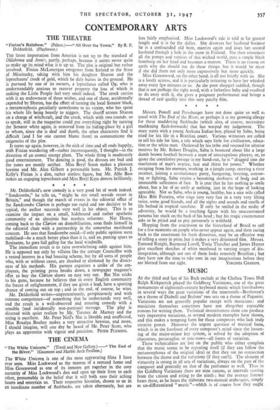CONTEMPORARY ARTS
THE THEATRE
Finian's Rainbow." (Palace.)—" AU Over the Town." By R. F. Delderfield. (Playhouse.)
THE latest importation from America is not up to the standard of Oklahoma and Annil, partly, perhaps, because it seems never quite to make up its mind what it is up to. The plot is original but rather involved. Finian McLonergan emigrates from Ireland to the State of Missitucky, taking with him his daughter Sharon and the leprechauns' crock of gold, which he duly buries in the ground. He is pursued by one of its owners, a leprechaun called Og, who is understandably anxious to recover property the loss of which is making the Little People feel very small indeed. The crock carries with it an endowment of three wishes, and one of these, accidentally expended by Sharon, has the effect of turning the local Senator black, a metamorphosis .peculiarly unwelcome to its victim, who has spent his whole life being beastly to niggers. The sheriff arrests Sharon on a charge of witchcraft, and the crock, which with two rounds, so to speak, still in the magazine could put everything right by turning the Senator white again, is removed from its hiding-place by a girl to whom, since she is deaf and dumb, the other characters find it difficult (and I for one cannot blame them) to communicate the exigencies of the plot.
It turns up again, however, in the nick of time and all ends happily, with Finian wandering off—rather inconsequently, I thought—in the direction of an atomic energy plant. The whole thing is moderately good entertainment. The dancing is good, the dresses are bad and the tunes are mostly neither. Miss Beryl Seton makes a pleasant heroine and Mr. Alan Gilbert a personable hero. Mr. Patrick J. Kelly's Finian is a dim, rather aimless figure, but Mr. Alfie Bass makes an engaging leprechaun and Miss Beryl Kaye dances brilliantly.
* * *
Mr. Delderfield's new comedy is a very good bit of work indeed. " Sandcombe," he tells us, "might be any small seaside resort in Britain," and though the march of events in the editorial office of the Sahdcombe Clarion is perhaps too rapid and too decisive to be typical, the author succeeds very well in his object. This is to examine the impact on a small, hidebound and rather apathetic community of an altruistic but resolute reformer. Nat Hearn, coming back to the Clarion on demobilisation, soon finds himself in the editorial chair with a partnership in the somewhat moribund concern. He sees that Sandcombe could—if only public opinion were mobilised—be a much better place than it is, and so, putting spurs to Rosinante, he goes full gallop for the local windmills.
The immediate result is to raise overwhelming odds against him. He is opposed not only by villains like the corrupt Councillor with a vested interest in a bad housing scheme, but by all sorts of people who, with or without cause, are shocked or alienated by the direct- ness of his methods. His partner organises a strike of the em- ployees, the printing press breaks down, a newspaper magnate's offer to buy the Clarion shows an easy way out. But Nat sticks to his guns, because he believes that in every English community the forces of enlightenment, if they are given a lead, have a sporting chance of coming out on top ; and in the end, of course, he wins.
Mr. Delderfield writes—unpretentiously, perspicuously and with extreme competence—of something that he understands very well, and the result is a well-observed and amusing comedy with a sensible (and incidentally non-partisan) message. The play is directed with quiet realism by Mr. Terence de Marney and the acting is excellent. Mr. Peter Neil's Nat is likeable and unaffected, Miss Rosalyn Boulter makes a very attractive heroine, and more, I should imagine, will one day be heard of Mr. Peter Scott, who plays an apprentice with vigour and precision. PETER FLEMING.


































 Previous page
Previous page